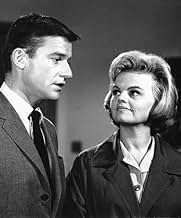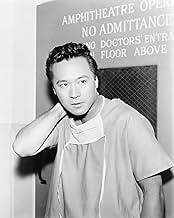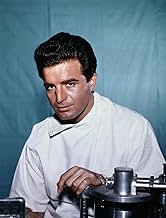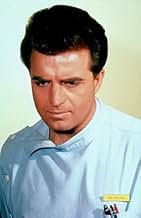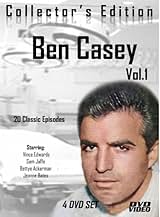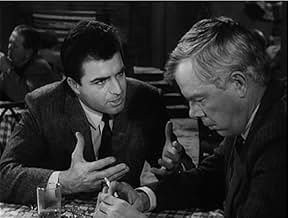Ben Casey
- Fernsehserie
- 1961–1966
- 1 Std.
Düsteres realistisches Krankenhausdrama mit dem männlichen Dr. Casey gegen das medizinische Establishment, zunächst unter den wachsamen Augen von Dr. Zorba und später unter dem Daumen des Ch... Alles lesenDüsteres realistisches Krankenhausdrama mit dem männlichen Dr. Casey gegen das medizinische Establishment, zunächst unter den wachsamen Augen von Dr. Zorba und später unter dem Daumen des Chefarztes der Chirurgie, Dr. Freeland.Düsteres realistisches Krankenhausdrama mit dem männlichen Dr. Casey gegen das medizinische Establishment, zunächst unter den wachsamen Augen von Dr. Zorba und später unter dem Daumen des Chefarztes der Chirurgie, Dr. Freeland.
- 2 Primetime Emmys gewonnen
- 3 Gewinne & 14 Nominierungen insgesamt
Folgen durchsuchen
Empfohlene Bewertungen
Until his counterpart,Dr. Kildare,Ben Casey was a resident of a large hospital,a full-fledged doctor on staff who was a very prominent neurosurgeon who was under the supervision of his mentor,Dr. Zorba. But just like any other medical doctor,Ben Casey always had his patients confidentality and tender care and sometimes have him going against the medical establishment at times with was sometimes the case along with him and his mentor finding the cure and making the demands of the both the patients and the staff he works under.
Ben Casey was a gritty medical drama that was also realistic which starred Vince Edwards going against the establishment and the administration not to mention his patients at fictional Metro General Hospital. The series was produced by Bing Crosby's production company,BCP Productions(filmed at Desilu Studios),and amazingly ran for five seasons on ABC-TV from October 2,1961 until March 21,1966 for 153 episodes all in classic black and white.The series aired on Monday nights in Prime-Time from October 2,1961 until May 13,1963 when it moved to Wednesday nights for the 1963-1964 season in favor of another Bing Crosby produced series "Breaking Point" on September 9,1963 until April 22,1964 where it faced strong competition from "The Dick Van Dyke Show",and "The Beverly Hillbillies". The show went back to Monday nights for its final two seasons from September 14,1964 until March 21,1966. The series also starred Sam Jaffe(who appeared in 127 episodes),as Casey's mentor,Dr. David Zorba,and Franchot Tone as Casey's friend and assistant Dr. Niles Freeland,and Harry Landers as Dr. Ted Hoffman. Vince Edwards' character of Dr. Casey you may say was a precursor to the changes that were happening during the time,which in point during the show's run,the country was going through the motions of its time,especially with the Cuba Missile Crisis,the Civil Rights Movement and the violent confrontations that occurred within the South with the unjustice of the Jim Crow laws,the assassination of President John Kennedy,the march on Washington,the signing of the Civil Rights Act,and the escalating war that went on in Vietnam,and rioting that occurred in sections of the country including the Watts riots,and so forth. In other words,America was at war with itself,and this occurred during the show's five year run. "Ben Casey" was given great support from the assistance of the American Medical Association which was behind some of the scenes during its production.
But getting back to Ben Casey,it was a groundbreaking medical show that had it share of some tough issues of that era,but case in point,Casey had to work with a system that was a monolith that existed for its own purpose and within its own momentum. He knew he had to deal with the pressures of a major medical hospital,so he had to wrestle with it especially with the mediocrity around it to get the job done. But within its own frame of dealing with that,you had his mentor,Dr. Zorba who often appeared to be more of a matador than a mentor,trying to tame the raging bull that was inside Ben Casey,as he always called him. That was the case in various episodes where the good doctor had to overcome the impossible in order to accomplish his task. There were two examples of this,one which had the Dr. Casey and Dr. Zorba in a malpractice suit where guest star,Beau Bridges was the center of the settlement,which was a good two-parter episode,and the other where Casey is bitten by a rat and goes into shock,and the other episode dealt with racism where Casey and his associates defend a black doctor,played by Greg Morris,who is accused of neglecting a patient and Casey has to defend him during a run-in with a discriminatory administrative staff.
The success of "Ben Casey" garnered 11 Prime-Time Emmy nominations winning 2 Prime-Time Emmy award in 1963 for Outstanding Actress in a Dramatic Series and Outstanding Actress in a Supporting Role. Vince Edwards along with Sam Jaffe received Emmy nominations for Best Actor and Best Supporting Actor in a Prime Time Series. However,"Ben Casey" paved the way for the next great medical dramas which included "Marcus Welby", "Medical Center", "Chicago Hope", "Trapper John", "E.R." to "Gray's Anatomy"......
Ben Casey was a gritty medical drama that was also realistic which starred Vince Edwards going against the establishment and the administration not to mention his patients at fictional Metro General Hospital. The series was produced by Bing Crosby's production company,BCP Productions(filmed at Desilu Studios),and amazingly ran for five seasons on ABC-TV from October 2,1961 until March 21,1966 for 153 episodes all in classic black and white.The series aired on Monday nights in Prime-Time from October 2,1961 until May 13,1963 when it moved to Wednesday nights for the 1963-1964 season in favor of another Bing Crosby produced series "Breaking Point" on September 9,1963 until April 22,1964 where it faced strong competition from "The Dick Van Dyke Show",and "The Beverly Hillbillies". The show went back to Monday nights for its final two seasons from September 14,1964 until March 21,1966. The series also starred Sam Jaffe(who appeared in 127 episodes),as Casey's mentor,Dr. David Zorba,and Franchot Tone as Casey's friend and assistant Dr. Niles Freeland,and Harry Landers as Dr. Ted Hoffman. Vince Edwards' character of Dr. Casey you may say was a precursor to the changes that were happening during the time,which in point during the show's run,the country was going through the motions of its time,especially with the Cuba Missile Crisis,the Civil Rights Movement and the violent confrontations that occurred within the South with the unjustice of the Jim Crow laws,the assassination of President John Kennedy,the march on Washington,the signing of the Civil Rights Act,and the escalating war that went on in Vietnam,and rioting that occurred in sections of the country including the Watts riots,and so forth. In other words,America was at war with itself,and this occurred during the show's five year run. "Ben Casey" was given great support from the assistance of the American Medical Association which was behind some of the scenes during its production.
But getting back to Ben Casey,it was a groundbreaking medical show that had it share of some tough issues of that era,but case in point,Casey had to work with a system that was a monolith that existed for its own purpose and within its own momentum. He knew he had to deal with the pressures of a major medical hospital,so he had to wrestle with it especially with the mediocrity around it to get the job done. But within its own frame of dealing with that,you had his mentor,Dr. Zorba who often appeared to be more of a matador than a mentor,trying to tame the raging bull that was inside Ben Casey,as he always called him. That was the case in various episodes where the good doctor had to overcome the impossible in order to accomplish his task. There were two examples of this,one which had the Dr. Casey and Dr. Zorba in a malpractice suit where guest star,Beau Bridges was the center of the settlement,which was a good two-parter episode,and the other where Casey is bitten by a rat and goes into shock,and the other episode dealt with racism where Casey and his associates defend a black doctor,played by Greg Morris,who is accused of neglecting a patient and Casey has to defend him during a run-in with a discriminatory administrative staff.
The success of "Ben Casey" garnered 11 Prime-Time Emmy nominations winning 2 Prime-Time Emmy award in 1963 for Outstanding Actress in a Dramatic Series and Outstanding Actress in a Supporting Role. Vince Edwards along with Sam Jaffe received Emmy nominations for Best Actor and Best Supporting Actor in a Prime Time Series. However,"Ben Casey" paved the way for the next great medical dramas which included "Marcus Welby", "Medical Center", "Chicago Hope", "Trapper John", "E.R." to "Gray's Anatomy"......
I used to watch this show (along with Dr. Kildare) which was on around the same era, and loved them both. This was in the 1960's. I just had to see Ben Casey show every week with the handsome Vince Edwards. Sam Jaffe as Dr. Zorba was also very good. I never watched Vince Edwards much after that, but to me he will always be Ben Casey.
They should bring out some episodes of Ben Casey on DVD or VHS? They bring out lots of other DVD's not half as good as the Ben Casey show was on TV. There must be lots of us still around who were young in the 60's who would buy them. Great show. Loved it. Bring it out on DVD soon.
They should bring out some episodes of Ben Casey on DVD or VHS? They bring out lots of other DVD's not half as good as the Ben Casey show was on TV. There must be lots of us still around who were young in the 60's who would buy them. Great show. Loved it. Bring it out on DVD soon.
Ben Casey and Dr. Kildare were exact contemporaries, both doctor shows that began and ended in the same season and were the most talked about shows on TV when they debuted in 1961. People were always making comparisons between them and here is mine.
One difference is that Casey was a resident, a full fledged doctor on staff at a hospital and a very prominent neurosurgeon. Kildare was an intern, a beginning doctor still learning the profession. If Kildare had been at the same hospital as Casey, Ben would have been bossing him around and making his life miserable.
A bigger difference was what they represented. Kildare was a symbol of the early 1960's. We were a very proud and optimistic country at that time. We'd survived the depression, won the war, had the communists on the defensive and were beginning to explore space. Social changes were taking place as well. if we were going to be the Greatest Country in the World, how could we have poverty and injustice? We tended to look at our government and institutions as benevolent servants of the people. There were several shows from this period, (Naked City, The Defenders, Mr. Novak were others), where handsome young idealistic novices entered a profession to be guided by their wise, patient but firm elders in becoming instruments of the system. The big challenge was getting people to trust the system by not committing crimes, studying hard and taking their pills. And of course, it's hard to look at the young men in these shows, (Richard Chamberlain, James Franciscus, Paul Burke, Robert Reed), and not see our youthful, idealistic president of the time, John Kennedy.
Casey was a precursor of the late 1960's. To him, the system was a monolith that existed for its own purposes and on its own momentum. You had to wrestle with it and with the mediocrity around you to get things done. Casey had a mentor as well, but Dr. Zorba often appeared to be more of a matador than a mentor, trying to tame Ben Casey, as he always called him, with a red cape and a sharp needle to puncture his ego from time to time.
I'd rather wake up from surgery and see Dr. Kildare's smiling face. But I'd be more likely to survive if it was Ben Casey who had done the surgery.
One difference is that Casey was a resident, a full fledged doctor on staff at a hospital and a very prominent neurosurgeon. Kildare was an intern, a beginning doctor still learning the profession. If Kildare had been at the same hospital as Casey, Ben would have been bossing him around and making his life miserable.
A bigger difference was what they represented. Kildare was a symbol of the early 1960's. We were a very proud and optimistic country at that time. We'd survived the depression, won the war, had the communists on the defensive and were beginning to explore space. Social changes were taking place as well. if we were going to be the Greatest Country in the World, how could we have poverty and injustice? We tended to look at our government and institutions as benevolent servants of the people. There were several shows from this period, (Naked City, The Defenders, Mr. Novak were others), where handsome young idealistic novices entered a profession to be guided by their wise, patient but firm elders in becoming instruments of the system. The big challenge was getting people to trust the system by not committing crimes, studying hard and taking their pills. And of course, it's hard to look at the young men in these shows, (Richard Chamberlain, James Franciscus, Paul Burke, Robert Reed), and not see our youthful, idealistic president of the time, John Kennedy.
Casey was a precursor of the late 1960's. To him, the system was a monolith that existed for its own purposes and on its own momentum. You had to wrestle with it and with the mediocrity around you to get things done. Casey had a mentor as well, but Dr. Zorba often appeared to be more of a matador than a mentor, trying to tame Ben Casey, as he always called him, with a red cape and a sharp needle to puncture his ego from time to time.
I'd rather wake up from surgery and see Dr. Kildare's smiling face. But I'd be more likely to survive if it was Ben Casey who had done the surgery.
Ben Casey was the greatest exemplar on TV of sixties confrontational characters. A dynamic professional above and beyond normal standards. If you were going to use him as a role model for your own career, you'd better be as brilliant as he was. You also have to have a brilliant mentor like Dr. Zorba who fully understands how brilliant you are and sees your career as virtually indispensable to the profession. I agree with the other member who compared him to Capt. Kirk. Kirk was in a more professionally secure place as captain of his own ship. If they served together, Ben might have physically intimidated him since he dominated scenes with such great actors as George C. Scott. Spock would have had a much better relationship with Casey than he did with McCoy. Neither of them suffered fools gladly. Casey would have known Vulcan, Klingon and Romulan physiology and psychology enough to impress Spock. Spock and Kirk would seek his advice on more than just medical matters.
If you are looking for the ultimate medical role model, then look no further. It's right here with Ben Casey. Dr. Casey is stalwart, resolute, ethical, courageous and above all clinically competent. He is everything a doctor should be. He's all business but he's compassionate too. Ben Casey is the greatest medical drama in the history of television broadcasting. All the other medical shows are in second place. One important reason for the show's excellence is the star of the show, Vincent Edwards. Mr. Edwards IS Ben Casey. Mr. Edwards took this character and made it into a television icon. He is to Ben Casey what William Shatner is to Star Trek. Both characters command respect, and earn it episode after episode. It's too bad that Dr. Casey and Captain Kirk never served together on the Starship Enterprise. THAT would have made for an interesting show.
Wusstest du schon
- WissenswertesAccording to director Mark Rydell, Vince Edwards had a gambling problem. Edwards demanded to film all of his scenes first, so that he could leave the set and go to a racetrack. According to Harry Landers, Edwards also constantly asked the cast and crew for money with which to gamble and leave the set for hours at a time.
- Zitate
[Opening narration.]
Narrator: Man... woman... birth... death... infinity.
- VerbindungenFeatured in Super Duper Bloopers and Silly Shorts (1986)
Top-Auswahl
Melde dich zum Bewerten an und greife auf die Watchlist für personalisierte Empfehlungen zu.
- How many seasons does Ben Casey have?Powered by Alexa
Details
- Laufzeit1 Stunde
- Farbe
Zu dieser Seite beitragen
Bearbeitung vorschlagen oder fehlenden Inhalt hinzufügen


